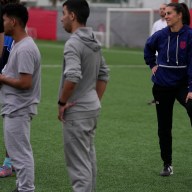Kate Bosworth knew Lisa Genova’s novel “Still Alice” before she wound up in the film. A portrait of a linguist (played in the movie by Julianne Moore) diagnosed with Early Onset Alzheimer’s, it touched on her own experiences: her grandmother suffers from dementia. She even hoped to option it with her own production company — only to find it was already in pre-production and needed someone to play Anna, one of Moore’s daughters. Bosworth talks to us about how “Still Alice” helps loved ones deal with those who suffer from it, the humor in it and working with a director struggling with his own disease. “Still Alice” is very nonjudgmental about the difficulties people often face dealing with those suffering from the disease.
People often respond to Alzheimer’s with fear. They don’t know how to help or fix or react. When I read this book it truly helped me understand it on a deeper level. It made the disease more transparent for people around those who are suffering from it. It made it less unknown. That’s probably what people respond to. It also doesn’t shy away from being funny. Alice sometimes deals with the disease by mocking it.
My grandmother suffers from dementia quite badly, and my mom and aunt and dad and cousin and husband, we all really take care of her together or pass the baton as a support system, every single day. And I’ll tell you what, it’s 50/50 tragedy and humor — and a lot of it’s a nice edge. My mom will pick up the phone and say, “Let me tell you what happened today…” The pendulum is always swinging, even from moment to moment. Your character is the more responsible sister, which might not be as fun as Kristen Stewart’s character, who is more freewheeling.
I’m often interested in characters, like Anna, who I don’t necessarily agree with. It’s more of a challenge. When you relate to the character 100 percent, you almost feel like you’re just inhabiting your own skin. Sometimes I’m interested in finding why a character’s choice rubs you the wrong way. You have to look at it and figure out why they’re making a bad decision and then get on board with it. When Anna pulls back from being involved in her mom’s life, I understand why. But for me, I would want to be there 100 percent for my mom. It’s not about being judgmental towards my character but understanding her choices. That’s when you get of your own way and become the person you’re playing. What about working with a cast largely made of women?
It’s rare, really, now, that you get to work with other actresses on this level. Normally you’re the lone wolf on the movie. You’re the wife or the girlfriend. It’s rare that you get to discover and explore complex relationships between women.= How do you keep things upbeat when the subject is so intense?
Even though the work was heavy and serious, we weren’t. I was selling my house at the time and Juli would and I would be chit-chatting about how it can be difficult to sell, especially in New York — literally up until they said action. She’d flip a switch. [She and Alec Baldwin, playing her husband] were both so joyful and generous with themselves and their experiences. They’ve done the work before they step on set. It was really wonderful to sit back and watch, as someone who’s not as experienced. I feel like sometimes actors feel they have to rip themselves apart. We’re all like that when we bound out of the gate, thinking we have to live for our art. The more experience I have the less I do that. This was directed by Wash Westmoreland and Richard Glatzer, the latter who was diagnosed with ALS, where the body shuts down. What are the challenges of being directed by someone who has trouble communicating? He was directing from an iPad. He couldn’t speak at this point. I’m a woman of few words on set. I respond best when a director says something very up to the point. It’s almost like an arrow: point at me and shoot. Because of the time it took him to type something, it was just like an arrow. He never minced words. He was to the point and really special.
Interview: Kate Bosworth on ‘Still Alice’ dealing with dementia with humor
Follow Matt Prigge on Twitter @mattprigge


















